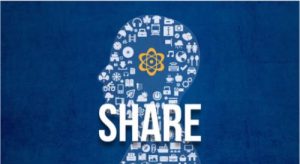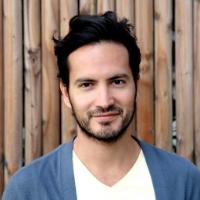
Wednesday, September 16, 2015 – 5.30-7.30pm
Feliciano School of Business Auditorium, Room 101
For directions, select School of Business from campus map
See media coverage for this event
See flyer
What’s the best way for researchers to collaborate across disciplines in the 21st century? A new free tool called Authorea is the occasion to address this question as part of a conversation about Digital Humanities with Italian entrepreneur, scientist, and Authorea co-founder Alberto Pepe who will provide a comparative look at past and present tools designed to produce and circulate scholarship.
Watch video about Authorea
In the early 1600s, Galileo Galilei turned a telescope toward Jupiter. In his log book each night, he drew to-scale, labeled, and dated schematic diagrams of Jupiter and some oddly-moving points of light near it. Through artistic and scientific renditions of his observations, he concluded that the Earth orbits the Sun, just as the four Galilean moons orbit Jupiter. Galileo’s clear and careful record keeping and publication style, which contributed significantly to the shaping of the modern “Scientific Method,” constitutes a point of departure for a reflection on research and dissemination of results today. Galileo’s notes directly integrated his data (drawings of Jupiter and its moons), key metadata (timing of each observation, weather, telescope properties), and text (descriptions of methods, analysis, and conclusions). From observation to publication, it took him three months to share his work. In our globalized and digital world, research and sharing are much more complicated operations, in large part because most tools that scientists use for the preparation of scholarly manuscripts, such as Microsoft Word and LaTeX, function offline and do not easily account for the born-digital nature of research objects. Also, most authoring tools in use today are not designed for collaboration, and, as scientific collaborations grow in size, research transparency and the attribution of scholarly credit are at stake. Authorea addresses precisely these challenges and offers a radically innovative way of addressing them.
In the course of the Sept. 16 meeting on our campus, Alberto Pepe will illustrate the platform of the startup Authorea that he co-founded in 2014. A group of interested scholars, both from the natural and social sciences as well as the humanities, will have the chance to see how, using the html technology instead of the usual pdf files, Authorea allows to collaboratively write rich data-driven manuscripts on the web. The results are articles that natively offer readers a dynamic, interactive experience with an article’s full text, images, data, and code. Thanks to this new concept, Authorea will help scholars of all disciplines pave the road to increased data sharing, data reuse, research reproducibility, and Open Science, just the way Galileo had intended it.
Program
- Introductory remarks: Robert S. Friedman (CHSS Dean)
- Moderators: Teresa Fiore (Inserra Chair) and Dennis Bone (Feliciano Center, Director)
- Presentation: Alberto Pepe (Authorea, co-founder)

Alberto Pepe, co-founder of Authorea, was born and raised in the wine-making town of Manduria, in Puglia, Southern Italy. Pepe holds an MSci in Computer Science and a B.Sci. in Astrophysics, both from University College London, U.K., as well as a Ph.D. in Information Science from the University of California, Los Angeles with a dissertation on scientific collaboration networks. Pepe has also worked in the Information Technology Department of CERN, in Geneva, Switzerland, and as Associate Research Scientist at Harvard University. He lives in New York City where he works on the development of his startup Authorea in one of the biggest “co-working spaces” in town, on 23rd St. and Park Avenue. Authorea was created thanks to the synergetic work of their two co-founders Pepe and Nathan Jenkins, and to the generous help of some “angel investors” who gathered substantial funds to launch the project. Born in 2014, Authorea has already reached over 25,000 users and aims at expanding that number in collaboration with academic institutions.
- Presented in collaboration with the Feliciano Center for Entrepreneurship at Montclair State University
- Spearheaded and organized by The Inserra Chair in Italian and Italian American Studies (Department of Spanish and Italian) at Montclair State University
Resources
Authorea: Official website
Featured interview with Alberto Pepe in La Voce di New York (in Italian)
Featured interview with Alberto Pepe in La Voce di New York (English version)
Featured interview with Alberto Pepe in Il Corriere della Sera (in Italian)
Featured blog interview by Maria Teresa Cometto (in English)
Select articles from Authorea.com
Resource Identification Initiative
Publication Cycle
Research Bazaar Conference 2016
From Academia to founding a startup: 5 tips
Resources for the Sept. 16 meeting
Article on Digital Humanities and Digital Creation
MLA (Modern Language Association) Core website
Fedora at Columbia University
Hydra Project: Multi-institutional collaboration
NYCDH: Digital Humanities in New York City
HASTAC (Humanities, Arts, Science, and Technology Alliance and Collaboratory) website
Academia.edu website: A platform for scholarly documents sharing
Article “A Manifesto for the Humanities in a Technological Age” by Cathy Davidson and David Theo Goldberg
For events on similar topics, click here
